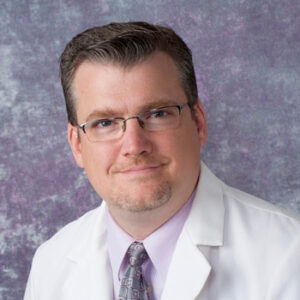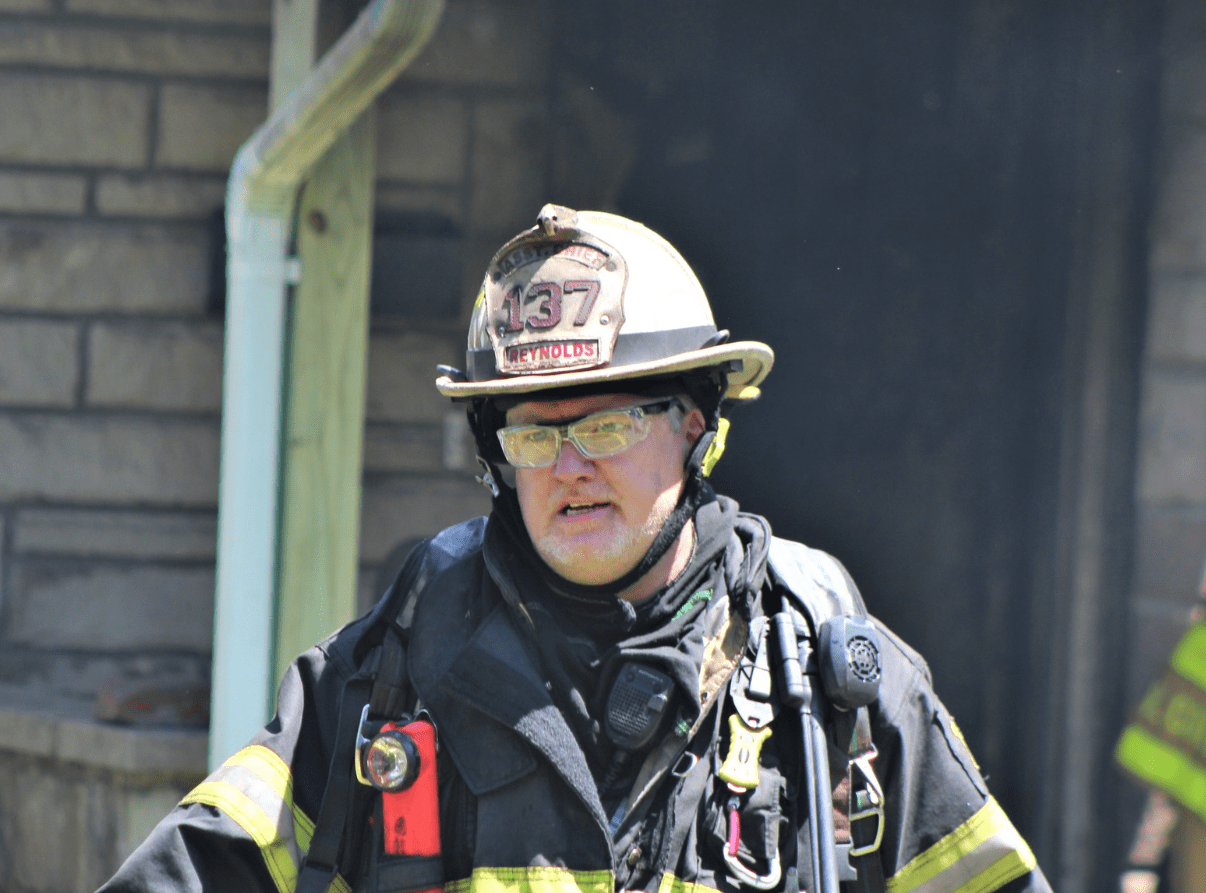PA Ben Reynolds Represents PAs at the Leadership Table
Chief Advanced Practice Officer and Volunteer Firefighter Serves the Profession and His Community
September 16, 2022
By Katy Shenk
 Ben Reynolds, MPAS, PA-C, DFAAPA, was thrust into fast-paced medicine as a Navy corpsman during the first Gulf War, where he was trained as a surgical technologist. It was witnessing PAs in action on the cardiac and abdominal transplant surgical services at Inova Fairfax Hospital, however, that convinced him to embark upon his surgical career as a PA.
Ben Reynolds, MPAS, PA-C, DFAAPA, was thrust into fast-paced medicine as a Navy corpsman during the first Gulf War, where he was trained as a surgical technologist. It was witnessing PAs in action on the cardiac and abdominal transplant surgical services at Inova Fairfax Hospital, however, that convinced him to embark upon his surgical career as a PA.
Reynolds has since worked in neurosurgery, vascular surgery, gastrointestinal surgery, emergency medicine, and eventually landed in trauma surgery, where he always saw himself practicing. He says being a clinical practicing PA is his “true north,” and finds a deep sense of accomplishment supporting critically injured patients in their journey through the trauma bay, OR, surgical floor, hospital discharge, and their first outpatient clinic visit.
Leaning into Leadership Roles
Reynolds currently works as the Chief Advanced Practice Officer at the University of Pittsburgh Medical Center (UPMC), a position he’s held since 2011. Stepping up hasn’t removed him from the brass tacks of the hospital floor, as continuing to practice in his clinical role keeps him grounded in his leadership position. “I am subject to all the same policies and leadership decisions that any other provider is. It’s valuable to see what works at the bedside, what does not, and where I can best exert my influence to improve the situation for PAs and other advanced practice providers,” he says. Especially in light of the pandemic and the leadership challenges it has posed, Reynolds advises clinical leaders to, above all else, be visible at the bedside to help and listen to others.
As a 2022 Presidential Leadership Scholar – one of the first advanced practice clinicians to be selected for this honor – Reynolds’ leadership advice carries some weight. The Presidential Leadership Scholars program is a highly competitive, six-month course on advanced leadership skills that brings together top professionals from a range of backgrounds and industries. During the program, Reynolds learned personally from former presidents Bill Clinton and George W. Bush, as well as senior members of their administrations, about how they addressed the greatest challenges and decisions of their presidencies. “The conversations and lessons were unvarnished and authentic; [this] was the greatest professional development activity of my life,” he says.
Program participants are expected to identify a way to apply the skills and connections they gain from the program to a project that benefits their community. Reynolds plans to partner with the University of Pittsburgh School of Health and Rehabilitation Sciences on an initiative to develop evidence-based tools to treat patients with lower back pain – a commonly cited gateway to prescription opioid disorder – with non-opioid alternatives. Passionate about opioid use disorder, Reynolds hopes that this initiative will help address the opioid epidemic in communities that UPMC serves.
Collaborating to Advance the Profession
 Reynolds takes advantage of his position at UPMC to advocate for PAs and other healthcare practitioners. In a panel presentation at the 2021 AAPA Executive Leadership Conference, he shared the innovative work UPMC has done to support the professional advancement of their nearly 4,000 midwives, nurse anesthetists, nurse practitioners, and PAs – work that, as a PA, Reynolds helps facilitate. “It makes me so proud to see presentations of PA leaders from major healthcare systems playing such an influential role in the executive direction of their respective organizations. PAs are at the leadership table and are here to stay,” he says.
Reynolds takes advantage of his position at UPMC to advocate for PAs and other healthcare practitioners. In a panel presentation at the 2021 AAPA Executive Leadership Conference, he shared the innovative work UPMC has done to support the professional advancement of their nearly 4,000 midwives, nurse anesthetists, nurse practitioners, and PAs – work that, as a PA, Reynolds helps facilitate. “It makes me so proud to see presentations of PA leaders from major healthcare systems playing such an influential role in the executive direction of their respective organizations. PAs are at the leadership table and are here to stay,” he says.
While at the conference, Reynolds found learning from the profession’s fellow leaders to be just as rewarding as recognizing the progress of PAs in the leadership space. “I was the beneficiary of a great deal of knowledge and new ideas from my colleagues with whom I served. These sorts of experiences are great cross-pollinators for leaders to refine and advance their own methodologies to promote better healthcare delivery at their own systems,” he shares. Reynolds previously volunteered with a group formed for a similar purpose: AAPA’s Blueprint to Leadership Task Force. The task force brought together PA leaders to share lessons learned and amass resources for the profession’s current and future leaders.
Reynolds also gives back to AAPA and the profession by supporting PAs climbing the leadership ladder, a nod to the influential mentors who advocated on his behalf when he was an early career PA. He currently helps review and interview PAs who are applying for their DFAAPA credential, a designation that recognizes distinction in professional advancement, leadership, professional interaction, learning and community service.
Continuing a Legacy of Community Service
 As if the stress and responsibility of working in trauma surgery weren’t enough, when he’s not at the hospital, Reynolds is fighting fires as the assistant fire chief of his borough’s volunteer fire department. He credits his family’s rich history in community service – both his father and grandfather were council members and past mayors of his hometown – as a catalyst for his own volunteerism. Reynolds’ first hands-on exposure to firefighting was in the Navy, when he was taught to fight shipboard fires, but he always admired his father’s dedication to volunteer firefighting as well.
As if the stress and responsibility of working in trauma surgery weren’t enough, when he’s not at the hospital, Reynolds is fighting fires as the assistant fire chief of his borough’s volunteer fire department. He credits his family’s rich history in community service – both his father and grandfather were council members and past mayors of his hometown – as a catalyst for his own volunteerism. Reynolds’ first hands-on exposure to firefighting was in the Navy, when he was taught to fight shipboard fires, but he always admired his father’s dedication to volunteer firefighting as well.
Firefighting, like trauma surgery, allows Reynolds to directly impact and save lives. “You get to see how you positively impact lives very close up, personally and locally. I tell people that had I not discovered the PA profession, I would have become a professional firefighter,” he says.
Reynolds is adamant that the lifeblood of a local community – and a profession – is sustained through participation. “Whether you volunteer in your community to make it better for your family or your neighbors, or you volunteer with your professional organization to improve the practice environment for your colleagues, the sorts of changes you want to see happen start with your own actions. Volunteerism harnesses the power of our passions to bring the greatest of ourselves to benefit others,” he says.
You May Also Like
Top 5 Ways to Get on the PA Leadership Path